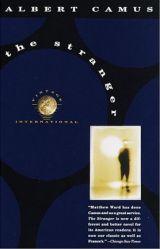


|
The Stranger (平装)
by Albert Camus
| Category:
Fiction |
| Market price: ¥ 128.00
MSL price:
¥ 118.00
[ Shop incentives ]
|
| Stock:
Pre-order item, lead time 3-7 weeks upon payment [ COD term does not apply to pre-order items ] |
MSL rating:
 Good for Gifts Good for Gifts |
| MSL Pointer Review:
A masterpiece of indifference and alienation, this sad story is about the narrowmindedness of society and the unfortunate individual who gets caught up in it. |
| If you want us to help you with the right titles you're looking for, or to make reading recommendations based on your needs, please contact our consultants. |

|
| |
AllReviews |
  1 2 Total 2 pages 12 items 1 2 Total 2 pages 12 items |
|
|
, USA
<2007-01-05 00:00>
Often those works of literature that are labelled as classics by the cultural and academic establishment are simply not accessible to the lay public. The Outsider (or The Stranger) by Albert Camus is an exception. This is a very easy to read book and yet it is not so easy to read. Camus lays his themes bare in a simple plot about a very ordinary man. Yet beneath the surface of ordinariness lies an extraordinary story. I believe that its impact as a philosophical and moral tale owes much to the raw and unpretentious presentation of the author in this case.
I shan't reveal the plot yet I will say that other reviewers' appraisals of the protagonist Meursault are interesting to say the least. To claim that he is unlikeable or evil is short-sighted and ultimately untrue in my opinion. In fact I felt compassion for Meursault and could identify with some of his psychology, which was brilliantly portrayed by Camus. One of the things that struck me most profoundly about Meursault is his rather dry penchant for calling a spade a spade and telling life like he sees it. He agrees to help his neighbour Raymond, for example, because he sees no reason not to. He is a loner but fundamentally a decent person. He is an outsider to social conventions and in many respects I applaud him for being so. I for one do not consider him guilty of anything other than being true to himself. Ultimately this is one reason why this book is so thoroughly thought-provoking. It will keep you thinking about it long after you have put it down.
|
|
|
Theodore Rushton (MSL quote), USA
<2007-01-05 00:00>
The intellectual emptiness of the French spirit, a existential excuse to totally avoid self-preservation or any positive action, is adroitly depicted in this brief book of moral emptiness.
The priority of normal life, from amoeba to kittens to citizens to complex societies, is to live and have control of one's life. The French have lost this innate sense of survival, and this story is an eloquent description of a young man who was once disappointed and thus forever insouciant.
The focus of this novel is a character who is a stark contrast to the typical Anglo attitude of resisting state, religious and most other authority; instead, he presents a person devoid of values who simply goes limp even when facing the state authority of the guillotine.
Such values nicely describe France and Camus. The French collapse in 1940 is described by the Germans as one of their "weekend wars." In 1942, Camus spent a year in 'Le Panelier,' an old granite house in the village of Le Chambon, leisurely writing The Plague. Like this book, it is an examination of man's willingness to allow killing without resisting it.
It's the attitude of a totally defeated and demoralized people, an anthem of, by and for spineless wimps. The Napoleonic era taught the French that hundreds of millions of Europeans rejected "liberation" when imposed by Franch cannons and bayonets. Since then, France has only survived as an independent state because of the hated "les anglais" who came to their rescue in 1914 and 1944.
Utterly devoid of any effort to control his own fate, Camus adroitly portrays a character who - like France itself - is a doormat for anyone and everyone. It's a shocking book by American standards, but it inadvertently sums up the current French attitude that it's pointless to even attempt anything that resembles affirmative effort.
Read it. Think of it as a contrast between the domineering aggressive attitudes of Americans and the surrender monkeys of France. It's an interesting insight into the mind and spirit of one of America's traditional allies; is timely, relevant and cogent.
|
|
|
|
  1 2 Total 2 pages 12 items 1 2 Total 2 pages 12 items |
|
|
|
|
|
|